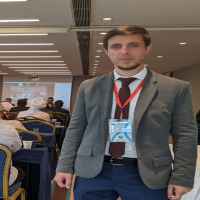Research Articles
Book Reviews
Issue Editorial Board


Aim & Scope
BALAGH - Journal of Islamic and Humanities Studies is an international, refereed, academic journal published twice a year (June - December) in Turkish, Arabic and English by Karabük University Faculty of Theology. It accepts articles for the first issue of the year between January 1 - April 30, and for the second issue between August 1 - October 30. Articles received after these dates are evaluated for the next issue. The journal accepts studies such as research articles, book reviews and symposium evaluations. Research articles are accepted only from researchers with a doctorate degree or, if ongoing, with the condition of being accompanied by the instructor they are an advisor to. Articles are first checked by editors. The double-blind refereeing process is initiated for approved articles and all articles are subject to plagiarism screening through relevant programs. Our journal accepts articles from all main and sub-branches of Islamic Sciences, as well as social sciences and other disciplines, provided that they are related.
BALAGH - Journal of Islamic and Humanities Studies publishes original research that contributes to the advancement of scholarly understanding and interpretation in the history and philosophy of religious thought in all traditions and periods, including Islamic Studies, Judaism, Christianity, Comparative Religious Studies, Theology and Ethics. BALAGH - Journal of Islamic and Humanities Studies publishes articles, book reviews and symposium evaluations in the field of religious studies (Social Sciences and Humanities/Religion).
Scope: Social and Human Sciences/Religion/Islamic Sciences/Comparative Religious Studies
Publication Language
Full Text Publication Language:
• Primary Language: Turkish
• Secondary Language: English
• Third Language: Arabic
Content Written in English and Latin Alphabet:
• Article Title: Turkish & English
• Article Abstract: Turkish & English
• Keywords: Turkish & English
• Author Name: Turkish (Latin Alphabet)
• Author Address: Turkish (Latin Alphabet)
• References: Turkish (Latin Alphabet)
Full Text: Turkish (Latin Alphabet) & English
Content Written in Arabic Alphabet:
• Article Title: Arabic & Turkish & English
• Article Abstract: Arabic & Turkish & English
• Author Name: Latin Alphabet
• Author Address: Turkish (Latin Alphabet) & English
• Keywords: Turkish & English & Arabic
• References: Arabic and Latin Alphabet
Writing Rules
- Article PreparationLanguage: Turkish, English and ArabicThe journal's language is Turkish, English and Arabic.Article Types: Research article, compilation article, translated article, research note, obituary, meeting abstract, book review,However, authors are requested to be as concise as possible for the dissemination of the work.Article Format: WordSource Notation Style: Isnad footnoted. See https://www.isnadsistemi.org/guide/isnad2/isnad-dipnotlu/Author Change: Only processed before the article is accepted. Authors must carefully review the list and order of authors before submitting their articles and provide the definitive author list during the original submission.As of Volume: 5 Issue: 1 (June) of 2025, only one study per researcher will be accepted for publication in the same issue. In addition, the same researcher is not allowed to publish twice in the same year.Writing Rules:The following rules should be observed for article writing.1. The text of the article should be Times New Roman font size 12 for studies written in Turkish and English. Those written in Arabic should be Traditional Arabic font size 16.3. Footnotes should be in the same font size 9.4. Footnotes and bibliography should be arranged according to the ISNAD citation system.5. The persons, places, works and terms used in the article should be prepared based on the TDV Islamic Encyclopedia (https://islamansiklopedisi.org.tr/). The editor has the right to make minor changes to the spelling of the articles. Consistency should be maintained in spelling, capitalized and transcribed words.6. Articles written in Arabic must also include English and Turkish summaries.7. In articles written in Arabic, the bibliography must also be written in the Latin alphabet.8. In articles written in Arabic, the font is Traditional Arabic.9. Turkish, English and Arabic summaries must be a maximum of 250 words.10. All abstracts must contain at least three (3) keywords. ISNAD principles must be applied in the selection of keywords. See https://www.isnadsistemi.org/guide/isnad2/akademik-yazim/5-anahtar-kelimelerin-secimi/11. The original title and bibliographic information of a translated article must be stated in the text.12. If an article is produced from a thesis or symposium, this must be stated in accordance with publication ethics. See https://www.isnadsistemi.org/guide/isnad2/akademik-yazim/1-yayin-etigi/yayin-etigi-beyani/13. Balagh Journal is published twice a year in June and December. The deadline for submission of articles for the December issue is October 30, and for the June issue is April 30. Depending on the volume of article submissions, the journal may close submissions earlier.14. The scientific, intellectual and literary responsibilities of the published articles belong to the authors, and since the journal has an open access policy, the copyrights do not belong to the journal.15. A study sent to the journal must be between a minimum of 5000 words and a maximum of 9000 words.Source Citation StyleArticles must be prepared according to the ISNAD Citation System.
Ethical Principles and Publication Policy
This journal checks for plagiarism in manuscripts submitted for review: Pre-checked manuscripts are scanned for plagiarism using iThenticate software. Authors are notified if plagiarism/self-plagiarism is detected. If necessary, editors may check the article for plagiarism at various stages of the review or production process. High similarity rates may result in a manuscript being rejected before or even after acceptance. This rate is expected to be less than 20%.
Articles are archived on the journal website and its own platform.
Price Policy
No fee is charged to the author or institution under any name.
All expenses of the journal are covered by Karabük University. There is no fee for the publication of articles in the journal and the execution of article processes. No processing or submission fee is charged for articles sent to the journal or accepted for publication.


